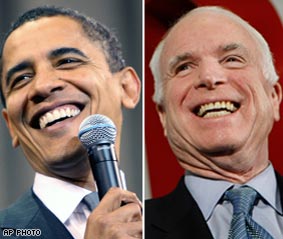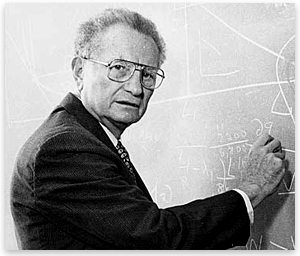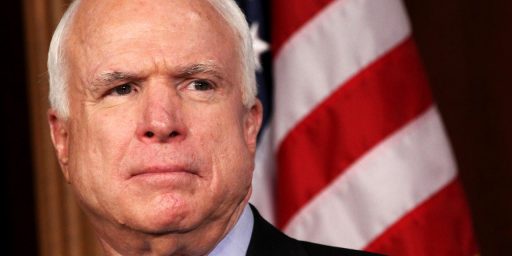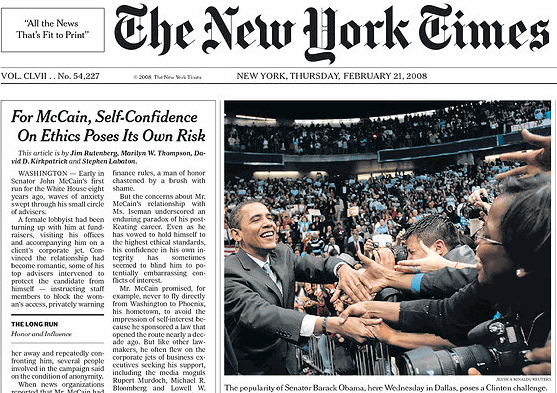Politics and Policy Collide
 Robert Samuelson notes that, the politics of winning and governing often collide. The first involves maximizing popularity. The second requires farsighted choices that ultimately benefit the country but may initially hurt a president’s approval ratings.”
Robert Samuelson notes that, the politics of winning and governing often collide. The first involves maximizing popularity. The second requires farsighted choices that ultimately benefit the country but may initially hurt a president’s approval ratings.”
Not exactly a novel observation but a truism worth remembering.
As to Barack Obama:
[S]ymbolism can’t substitute for policy, and any feel-good fallout from electing Obama would soon fade. He’d have to earn popular support, and this would be made harder by a problem of his own making: He’d have to disavow much of his campaign rhetoric. The reason is that his campaign is itself a contradiction.
On the one hand, he projects himself as the great conciliator. He uses the metaphor of his race to argue that he is uniquely suited to bridge differences between liberals and conservatives, young and old, rich and poor—to craft a new centrist politics. On the other hand, his actual agenda is highly partisan and undermines many of his stated goals. He wants to stimulate economic growth, but his hostility toward trade agreements threatens export-led growth (which is now beginning). He advocates greater energy independence but pretends this can occur without more domestic drilling for oil and natural gas.
[…]
Aside from ambition—hardly unique among presidential candidates—I cannot detect powerful convictions in Obama. He seems merely expedient in peddling his convenient conflicts. He strikes me as a super-successful graduate student: the brightest, quickest, most articulate guy in the seminar. In his career, he has advanced mainly by talking and writing—not doing—and may harbor a delusion common to the well-educated: that he can argue and explain his way around any problem.
So, obviously, Samuelson is supporting McCain? Not so fast!
By contrast, no one can claim that McCain lacks convictions. He has often defied Republican Party orthodoxy, and his credentials to lead a centrist coalition are stronger than Obama’s. According to Politico, he sided with his party only 83 percent of the time from 2005 to 2007. Even in this election year, he has taken unpopular positions. Note his criticism of farm subsidies, which won’t help him in the Midwest. The trouble with McCain is that he often mistakes stubbornness for principle.
He has a hard time changing his mind, even when the evidence overwhelmingly suggests he’s wrong. He has stuck with “campaign finance reform” despite its dismal record. After three decades, it has entangled political campaigns in rules and paperwork without solving any notable problem (for example, people continue to believe that wealthy “special interests” have too much influence). On immigration, he still does not grasp what I think is the actual problem: not illegal immigration so much as too many poor and unskilled immigrants, whether legal or illegal. Like Obama, he seems oblivious to the possible unintended consequences of endorsing an anti-global-warming “cap-and-trade” program.
Steadfastness and good judgment are qualities we value in a president, and McCain has often displayed these. He was early and correct in his criticism of the Bush administration’s conduct of the Iraq war and of its treatment of prisoners. He has been consistent in his opposition to high and wasteful federal spending. But good judgment must accompany steadfastness, and there are enough instances of McCain’s bad judgment to make you wonder which would prevail.
Samuelson jokes that you should “vote for McBama” but, not wanting to end there, suggests that the closest thing to that is divided government which, realistically, means President McCain and a House and Senate with more Democrats in 2009 than now.





This “politicking versus policy” situation is great. Such as politicians wanting to be tough on crime, but at the same time not knowing how to pay for more judges, court houses and jails. Good policy would be to have better rehab programs for drug offenders and better work programs for ex-convicts, but people want to hear someone say they’re going to end crime, even though it’s a silly statement.